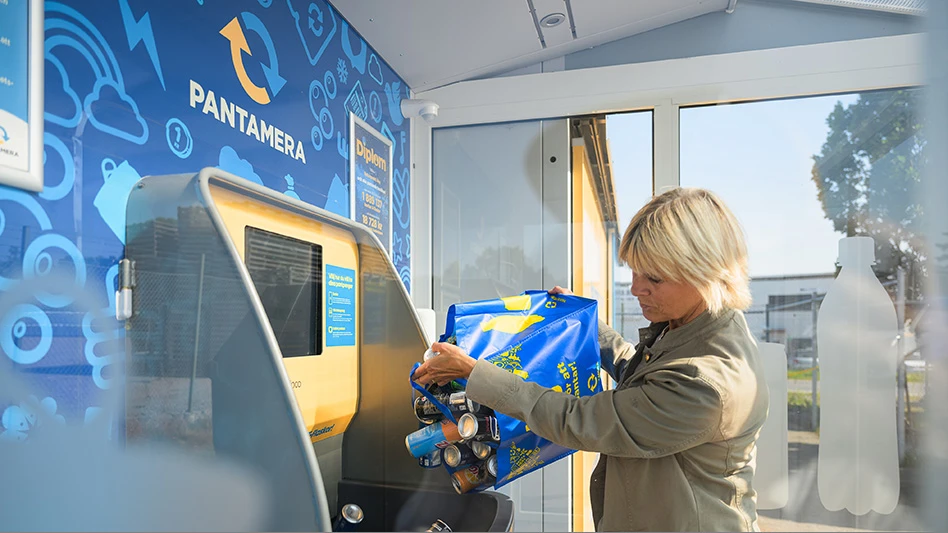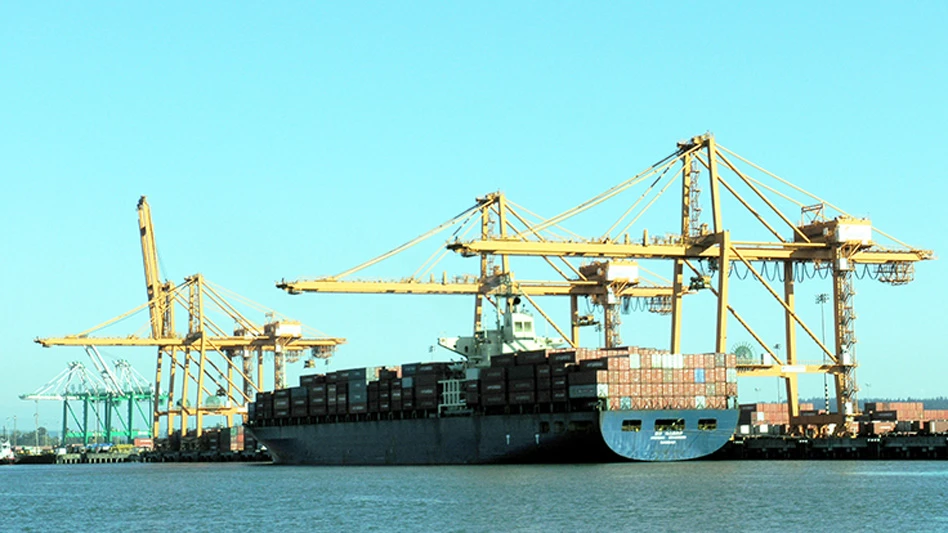Document shredding firms have well-established processese and markets for paper. However, shredding electronics can be very different, and with the exception of metal can yield materials with less robust markets.
For some information destruction firms, handling electronics often means having to pay a third party to take in some of the material. For instance, computer monitors appear to be one of the largest problems for many shredding firms that see opportunities in handling electronics.
However, some document destruction firms are finding it opportune to develop partnerships with electronic scrap recycling firms as a way to grow their businesses. Electronics recycling firms can also be willing to reach out for an ally on the paper documents side.
CHOOSING A COURSE
Amanda Hale, with the electronics recycler United Recycling Industries (URI), headquartered in the Chicago area, says URI has been working to develop partnership arrangements with document destruction companies. "Most [document shredding firms] don’t want to get into our business," Hale says. "Mostly they are looking for someone they can recommend."
Jerry Martin with The Shredders, a long-time document destruction firm based in Los Angeles, avoids the whole process of handling electronic media destruction. "It doesn’t make any financial sense to us," he says. "I don’t have anything to do with it."
While Martin steers clear of handling electronics, he suggests to his clients a company or organization that can handle the material.
Martin provides many reasons for why he avoids spending time, money and effort developing this potential market. With the size of The Shredders’ existing business, there is only downside to investing in processes to handle electronics, he says. The material has to be shrink-wrapped and palletized and would require two employees to service the account. And, with the company making from 25 to 30 stops per day, "it just wouldn’t make financial sense," Martin adds.
While avoiding directly handling electronic scrap seems to be a common approach many companies take, some document destruction firms recognize that there are opportunities to be had by branching out into this ancillary business.
Some document destruction firms have been motivated to pursue electronic media destruction by the erosion of their profit margins. With many smaller, mobile shredding operations entering the market and chasing smaller accounts and large national operations also wielding their clout through pricing power, some companies are realizing that the best way to protect and to grow their businesses is to become a "one-stop" secure information management operation.
While one possibility is for a secure document destruction firm to add electronics, Chesapeake Recycling Inc., Winamic, Ind., evolved from a pure electronic destruction and recycling firm to also providing document destruction services. Ed Shank, sales manager for Chesapeake Recycling, says that the move to paper shredding services was viewed as an opportunity to expand the company’s business. "It opens doors both ways. It allows our company to offer more services," he says.
| Two Paths |
|
Many document destruction companies contacted for this story treat electronic scrap as an incidental part of their major business. If a large customer has some computers to get rid of, a document destruction firm may take them, though they don’t actively pursue this business. However, some document destruction veterans feels there is a significant upside to this segment of the destruction business. Tom McGinnis, president of E-Data Shred, Brockton, Mass., is a classic case. McGinnis began his career in the paper recycling business. From there he began City Shredding, a National Association for Information Destruction (NAID) AAA-certified firm. After Cintas acquired City Shredding last year, McGinnis got involved in electronic media destruction. While there are a number of differences between paper shredding and electronics destruction, McGinnis says that many of the dynamics of the two sides are the same—the most important thing is ensuring that the customers’ material is being destroyed and recycled in a safe, secure and confidential manner. "What customers are most interested in is integrity, reputation, the way you handle the business, the security," McGinnis says. "The same thing that a customer should be interested in when contacting a paper shredding operation." Conversely, a large Midwest-based shredding company contacted for this story has considered adding an electronic destruction component. But presently, the company has a relationship with a specialist that it uses to shred hard drives and other electronics. |
While only a handful of companies presently provide full destruction services for paper and electronics, Shank says that companies looking to take advantage of the available opportunities must treat both streams the same. "You have to treat the electronics like the paper. The biggest issue is handling the material in the proper way," Shank notes.
While this approach has some advocates, a number of companies that are more centrally focused on destroying electronics find more opportunity in partnerships between secure document destruction firms and secure electronics recyclers, rather than in adding a new component to a business.
Joe Harford, a principal with Reclamere Inc., a Tyrone, Pa.-based I.T. asset management and electronics recycling company, says that for most secure destruction companies, close to 95 percent of their business comes from the paper shredding side. He questions the logic of investing in a process that may make up only around 5 percent of the business. "It doesn’t make sense to focus on material that will only make up a small percent of a company’s revenue," he says.
Harford says transportation and logistics concerning electronic scrap are among the biggest concerns for companies that are going to collect, process and market the material. This is an area, Harford says, where Reclamere has an advantage. Since opening in 2001, the company is able to move material anywhere within the country.
"We have been fortunate," Harford says. "We are destroying hundreds of hard drives a day."
This scale has allowed Reclamere to get a better grasp of the logistics side of the I.T. asset management and electronic media destruction business, making it more effective in dealing with large or national accounts, he contends.
Despite an increased understanding of the risks of identity theft, Harford feels that while most companies understand the need to shred paper documents, they "are about two years behind with computer destruction." However, he adds, "Many companies are learning fast."
Harford has some suggestions for companies in the market for a firm to destroy their electronic media. These include: performing significant due diligence; examining the recycler’s or asset recovery firm’s financial statement to ensure that the operator is legitimate; finding out what kind of insurance the company carries; checking references; and performing an on-site inspection, when possible.
Because of the relative newness of the electronic media destruction business, there are opportunities for new companies. The industry’s fragmented nature means that smaller companies are finding plenty of opportunities on which they can capitalize.
SECURE PRACTICES
Hale says that URI has received a growing number of inquiries about partnership opportunities from document destruction companies throughout the past several years. With United Recycling handling from 35 to 40 million pounds of electronics per year, it has established itself as a reputable operation. The company, which started in 1950 as a refiner of precious metals, has expanded its electronics recycling division to be able to handle more electronic scrap.
URI is finding that many document shredding firms don’t want to get into the electronic scrap side of the business, but find it helpful to establish a working relationship with a company that can provide the service.
While there are partnership opportunities, those on both sides of the fence say that a key to a successful partnership is to ensure that both companies maintain the same security and confidentiality standards. For document destruction firms that are National Association for Information Destruction (NAID) AAA certified, setting up a partnership arrangement with a company that does not provide the needed security could cause irreparable damage to the company’s reputation and business.
Many NAID member companies that are AAA certified for paper destruction also adhere to the certification standards when handling hard drives, tapes and other electronic media.
Bob Johnson, executive director of NAID, which is based in Phoenix, adds that in addition to policies on destroying hard drives, the association is working in conjunction with a professor at Harvard University on the efficacy of software wiping, a non-destructive method for eliminating the information stored on hard drives. Johnson notes that NAID’s procedures focus only on the components of electronics that contain information, such as hard drives.
RECOGNIZING OPPORTUNITIES
While only a few companies offer full services covering the secure destruction of electronics and paper documents, that doesn’t mean that document destruction companies are not cognizant of the growing demand for electronic media destruction services. And it also does not mean that electronic scrap recycling companies don’t see the opportunities available in building partnerships and relationships with companies handling the paper destruction side of the business.
One aspect that does provide some challenges to establishing a successful partnership between an electronics recycler and a document destruction firm is that often different people at a company handle the paper document destruction services and the I.T. disposition services, which means that a company may have to spend more time nurturing new contacts to develop business.
Also in the market are electronics-focused companies such as Reclamere that feel a key way to develop their business is to strengthen their connection with NAID and its members.
Joe Bozik with dataXile, a fairly new asset disposition and destruction firm, says that, as a member of NAID, the company has been able to boost its credibility. However, he is quick to point out that the company is not a recycler, rather it is an information/data security system management firm.
Bozik says that the differentiation means that the company is focused on providing the proper, secure destruction methods that many companies need. This means that dataXile will go to a client’s office to provide on-site electronic asset disposition.
Another factor that influences some document destruction firms’ decisions not to actively pursue more electronics destruction opportunities is the fact that sparks can be created during the shredding/grinding process. Such an occurrence could prove dangerous for a company if there is a lot of paper dust in the air.
While many document destruction firms acknowledge that there are some good growth opportunities on the electronics side of the business, the fundamentals are still challenging. Additional space for equipment to destroy the electronics may be required, as would a well-established supply chain infrastructure for the electronics and a consistent stream of material to make the investments worthwhile.
But, as profit margins shrink in the business and competition continues to intensify, more shredding companies may look to add the destruction of electronic equipment to their menu of services to make sure they stand out from the competition.
The author is senior and Internet editor of SDB magazine and can be contacted at dsandoval@gie.net.

Explore the April 2006 Issue
Check out more from this issue and find your next story to read.
Latest from Recycling Today
- CP Group announces new senior vice president
- APR publishes Design Guide in French
- AmSty recorded first sales of PolyRenew Styrene in 2024
- PRE says EU’s plastic recycling industry at a breaking point
- Call2Recycle Canada, Staples Professional expand partnership
- Circular Services breaks ground on north Texas MRF
- Tariff uncertainty results in choppy nonferrous scrap flows
- CATL, Ellen MacArthur Foundation establish battery partnership






